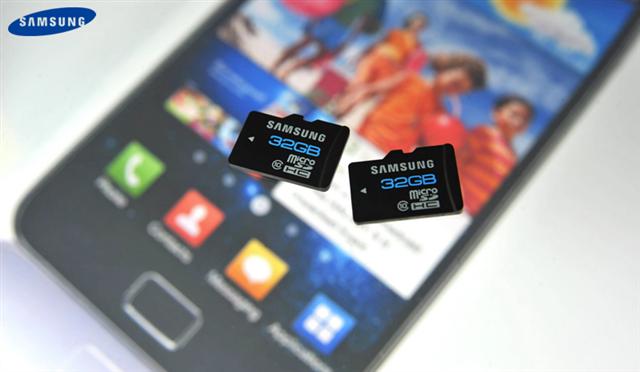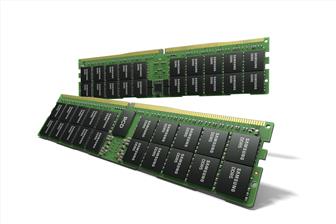
Samsung Electronics has announced production of its micro Secure Digital (microSD) cards that support 4G smartphones. The new 20nm-class microSD cards have a Class 10 speed rating.
The new 32GB microSD cards can write at 12 megabytes per second (MB/s) and read at 24MB/s, providing users with more than double the maximum write speeds of a Class 4 rated 32GB microSD card. The new 32GB memory card incorporates 32Gb 3-bit NAND flash memory chips and a proprietary 3-bit NAND controller.
The new card follows the introduction of Samsung's 30nm-class, 3-bit-per-cell (3-bit) NAND-based 32GB microSD cards in February 2010. By applying the finer 20nm-class process technology, the productivity of the chips is raised over 30%, the company said.

Samsung HKMG DDR5
Samsung Electronics has expanded its DDR5 DRAM memory portfolio with a 512GB DDR5 module...
Photo: Company

Nvidia GeForce RTX 30 series GPUs
Nvidia's GeForce RTX 30 series GPUs are powered by the company's Ampere architecture. The...
Photo: Company

Apple HomePod mini
Apple's HomePod mini is the newest addition to the HomePod family. At just 3.3 inches tall,...
Photo: Company

Apple 13-inch MacBook Pro with Magic Keyboard
Apple has updated the 13-inch MacBook Pro with the new Magic Keyboard for an improved typing...
Photo: Company

Apple iPad Pros
Apple's new iPad Pros comes with the latest A12Z Bionic chip, an ultra-wide camera, studio-quality...
Photo: Company
- Huawei's latest AI processors were made by TSMC (Oct 22) - Bloomberg
- Arm to scrap Qualcomm chip design license in feud escalation (Oct 23) - Bloomberg
- Embedded World brings 3,500 visitors to 1st US outing (Oct 11) - EE Times
- Preparing electronics engineering students for industry (Oct 8) - EETimes Europe
- Former Apple hardware chief Dan Riccio is retiring (Oct 11) - Ars Technica
- Key takeaways as China outlines plans to revive economy, end housing slump (Oct 11) - Bloomberg
- Taiwan's president vows to resist 'annexation' (Oct 10) - BBC News
- Indonesia asks Apple, Google to block China's Temu to protect small merchants (Oct 11) - Reuters
![]() Microsoft's custom chip sets new industry benchmark while deepening AI partnerships across sectors
Microsoft's custom chip sets new industry benchmark while deepening AI partnerships across sectorsAs Microsoft transitions from a software giant to a cloud leader, with its cloud business now accounting...
![]() Startups and innovations
Startups and innovationsTake a look at the innovative ideas, products and services that startups offer.

CSP in-house development of ASIC accelerators
Google TPUs will see a share of over 70% in the in-house developed cloud ASIC accelerator market in 2024; an all-optical network...

AI chip market outlook 2023-2028: Insights from demand and supply perspectives
The growing demand for AI computational power is accelerating advancements in hardware and chip technology, necessitating innovation...

Automotive CIS tech development, 2024
The popularization of autonomous driving is boosting demand for automotive CIS with LFM and HDR being mainstream development...






